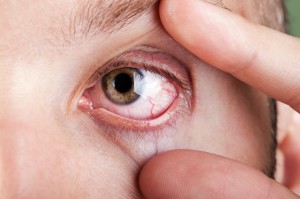| |
Dry Eye
Syndrome (DES)
When you blink, a film of tears spreads
over the eye, making the surface of the eye smooth and clear. Without
this tear film, good vision would not be possible.
Dry eyes result when people don’t produce
the right quality or amount of tears to keep their eyes comfortable and
healthy. Normally the eye is constantly bathed in tears. The eye stays
comfortable and moist, and produces tears when necessary. People with
Dry Eye Syndrome do not produce enough good quality tears.
|
|
|
| |
|
Sometimes people don't produce enough tears or the right
quality of tears to keep their eyes healthy and comfortable.
This condition is known as dry eye.
|
|
The tear film consists of three layers:
• An oily layer;
• A watery layer;
• A layer of mucus. |
|
| |
Symptoms of
Dry Eye
Dry eyes feel uncomfortable. Dry eye can be itchy
and irritating. If you have dry eyes, your eyes may sting or burn. You
may experience dry eyes in certain situations, such as on an airplane,
in an air-conditioned room, while riding a bike, after looking at a
computer screen for a few hours, or upon waking in the morning. |
| |
 |
Symptoms, which usually affect both eyes, may include:
• A stinging, burning or scratchy sensation in
your eyes
• Stringy mucus in or around your eyes
•
Increased eye irritation from smoke or wind
• Eye
fatigue
• Sensitivity to light
• Eye
redness
• A sensation of having something in your
eyes
• Difficulty wearing contact lenses
•
Periods of excessive tearing
• Blurred vision, often
worsening by prolonged focusing or by end of the day |
|
| |
| Causes of Dry
Eyes |
| |
| There are many causes of dry eyes, but most cases are due to Aqueous Tear Deficiency (ATD) and Meibomian
Gland Dysfunction (MGD). Eyelid problems, medications, and other causes,
such as environmental factors, also can lead to dry eyes. Inform Dr.
Tracy if you are on any medication for high blood pressure,
beta-blockers, antihistamines, sleeping pills, anti-anxiety medications,
or pain relievers. These medications, whether prescribed or over the
counter, can cause or contribute to dry eyes. |
| |
Environmental conditions
such as dry, windy air or being in a room with air conditioning or a fan
can also cause dry, irritated eyes. Tasks that require concentration
resulting in blinking less often, such as working at a computer or
driving, can cause dryness and irritation as well.
Poor Tear Quality – The tear film has three basic
layers: oil, water, and mucus. Problems with any of these layers can
cause dry eye symptoms.
Decreased Tear Production – People who
usually experience decreased tear production are older than 50, have
tear gland damage, have a medical condition that reduces tear
production, or have had any type of eye surgery in the past.
Eyelid Problems – If you have an eyelid problem that makes it difficult
to blink, tears may not be spread across your eye adequately or your
tears may evaporate too quickly, causing dry eyes. |
| |
Each layer has its own purpose. The oily
layer, produced by the meibomian glands, forms the outermost surface of
the tear film. Its main purpose is to smooth the tear surface and reduce
evaporation of tears.
The middle watery layer makes up most of
what we ordinarily think of as tears. This layer, produced by the
lacrimal glands in the eyelids, cleanses the eye and washes away foreign
particles or irritants.
The inner layer consists of mucus
produced by the conjunctiva. Mucus allows the watery layer to spread
evenly over the surface of the eye and helps the eye remain moist.
Without mucus, tears would not stick to the eye. Normally, the
eye constantly bathes itself in tears. By producing tears at a slow and
steady rate, the eye stays moist and comfortable. |
| |
|
| |
Normally, the eye bathes itself
in tears. By producing tears at a slow and steady rate, the eye stays
moist and comfortable.
The eye uses two different methods to
produce tears. It can make tears at a slow, steady rate to maintain
normal eye lubrication. It can also produce a lot of tears in response
to eye irritation or emotion. When a foreign body or dryness irritates
the eye, or when a person cries, excessive tearing occurs.
It may
not sound logical that dry eye would cause excess tearing, but think of
it as the eye's response to discomfort. If the tears responsible for
maintaining lubrication do not keep the eye wet enough, the eye becomes
irritated. Eye irritation prompts the gland that makes tears (called the
lacrimal gland) to release a large volume of tears, overwhelming the
tear drainage system. These excess tears then overflow from your eye. |
| |
Contact A Dry Eye Expert Today
Dry eye is extremely common and can effect anyone. If you suffer
from dry eye, please do not hesitate to
make an appointment with a board
certified specialist. For more information on dry eye syndrome, or to
book an appointment with Dr. Tracy, please call (760) 603-9910. |
| |